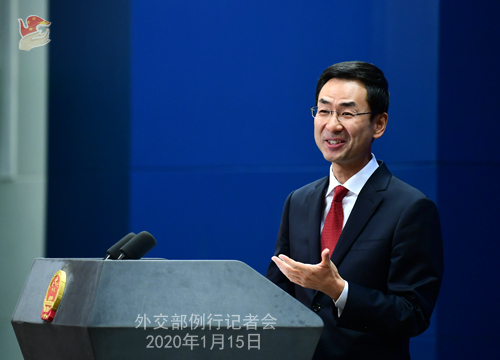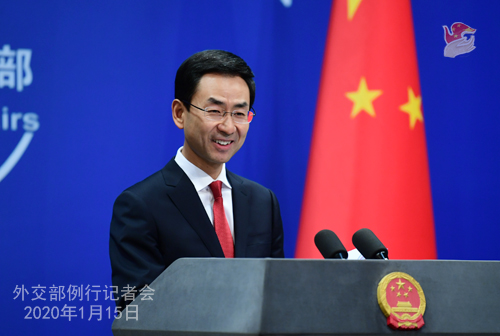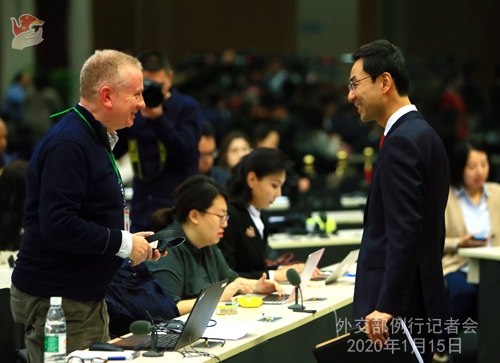| Foreign Ministry Spokesperson Geng Shuang's Regular Press Conference on January 15, 2020 |
| 2020-01-15 19:48 |
|
Q: According to reports, foreign ministers of Britain, France and Germany have sent a letter to the EU's High Representative for Foreign Affairs and Security Policy Joseph Borrell and issued a joint statement announcing the initiation of the dispute mechanism of the JCPOA. They stressed their aim was to bring Iran back to compliance. What's China' s comment? A: China regrets that Britain, France and Germany have triggered the dispute mechanism of the JCPOA. We don't believe it will help solve any problem or ease any tensions. It is China's consistent view that there are strong reasons behind Iran's reduction of compliance. The US unilaterally withdrew from this agreement. In disregard of international law and obligations, it resorted to maximum pressure on Iran and thwarted other parties' efforts to implement the deal. This is the root cause of the tensions on the Iranian nuclear issue. The JCPOA is an important outcome of multilateral diplomacy endorsed by UN Security Council resolution. As a pillar for the non-proliferation regime and Middle East peace and stability, it is a key component of the international order based on international law. Under current circumstances, we hope all parties will remain calm and restrained, resolve differences regarding compliance through dialogue and consultation under the JCPOA Joint Commission, and take concrete actions to preserve and implement the deal by restoring the balance of rights and obligations. China will continue to keep close communication with all parties to facilitate peace through dialogue and work for a political and diplomatic settlement of the Iranian nuclear issue. We will do all we can to help ease tensions surrounding the Iranian nuclear issue and in the Middle East. Q: On Monday Russian Deputy Foreign Minister Morgulov met with his Chinese counterpart Luo Zhaohui in Moscow and discussed the Korean Peninsula issue and Russia-China cooperation in the Asia-Pacific region. Can you give us any details of the results of the negotiations? A: On January 13, Vice Foreign Minister Luo Zhaohui held consultations with his Russian counterpart Morgulov in Moscow and held in-depth exchange over the Korean Peninsula issue and Asia-Pacific. The two sides agreed that sustaining the momentum for dialogue and detente on the Peninsula serves the shared interests of all parties and is the common expectation of the international community. They called on the DPRK and the US to stick to the right direction of dialogue and consultation, move towards each other and seek effective means to break the impasse and address each other's concerns. The two sides also reiterated their support for the DPRK and the ROK in improving relations and realizing reconciliation and cooperation. They agreed to go on playing positive roles in facilitating the political settlement process on the Peninsula. During the consultation, the two sides also exchanged views on the Asia-Pacific situation and other regional and international issues of common concern. They agreed that faced with the complex and fluid regional landscape, China and Russia should further enhance coordination and collaboration on major issues in the Asia-Pacific region to play a constructive role in maintaining strategic stability and prosperity in the region.
Q: There have been two reports from Human Rights Watch and Freedom House that accused the Chinese government of using political and economic power to damage human rights. They cite things like surveillance, what they described as "information manipulation", and expanding global influence through Chinese media. And they are accusing China of posing a threat to democratic society. So I just wanted to ask your response. A: I haven't seen the two reports and have no interest in reading them. As you know, the two organizations are entrenched in bias against China. Their comments or reports on China are invariably filled with distortion of facts. No objectivity at all. They are not even worth refuting. I will just state two simple points. First, the Chinese people are in the best position to judge China's human rights condition, which is at its historical best. Second, Chinese media, committed to objective, impartial, true and accurate coverage, has played an active role in enhancing mutual understanding between China and other countries. Chinese citizens' freedom of speech, a Constitutional right, has been fully protected. Q: A China Coast Guard (CCG) vessel laid anchor at the Port of Manila on the morning of January 14, the first port call by a CCG vessel to the Philippines. How do you characterize the significance of this visit? A: The CCG vessel 5204 arrived at the Philippines yesterday morning, and the Philippine side held a grand welcome ceremony for it. The CCG and the Philippine Coast Guard (PCG) had cross-deck visits and held friendly exchange. The CCG delegation donated its on-board reserve food supplies to locals affected by the recent Taal volcanic eruption, extending the Chinese people's goodwill and solicitude. As I understand, the CCG and the PCG will conduct joint maritime search and rescue (SAR) and fire drills, and other activities like vessel open day, friendship sports games and deck reception. As far as I know, this is part of the friendly exchanges scheduled for the third meeting of the Joint Coast Guard Committee (JCGC) between the CCG and the PCG. At this meeting, the two sides will exchange in-depth views on maritime law enforcement and other issues of mutual interest and discuss stepping up cooperation in such key areas as combating transnational crime and drug trafficking at sea, maritime SAR and humanitarian relief. We believe closer cooperation between the CCG and the PCG will enhance mutual trust and friendship between the two sides, introduce a new form of practical maritime cooperation and inject new impetus to the sound and steady development of China-Philippines relations. This inspiring port call marks a new step forward in the cooperation between the CCG and the PCG. We look forward to a reciprocal visit by the PCG at its convenience. Q: Today Russian Foreign Minister Lavrov in New Delhi announced that Russia welcomes Iranian request for membership in Shanghai Cooperation Organization. What is the position of the Chinese side for the Iranian membership in this international organization? A: I haven't seen Foreign Minister Lavrov's latest remarks and will check afterwards. I understand Iran, already an observer of the SCO, has long been participating in relevant events. With regard to SCO expansion, China will stay in close communication with other members and make decisions together.
Q: ROK's President Moon Jae-in said in his New Year press conference on January 14 that improving ROK-DPRK relations will facilitate DPRK-US dialogue and also help win international support in connection with some exemptions or exceptions to sanctions on the DPRK. China has played an important role in the Korean Peninsula nuclear issue. The ROK will work together with China to solve relevant issues. What's China's comment? A: China is committed to peace, stability and denuclearization on the Korean Peninsula. We stand for resolving outstanding issues through dialogue and consultation to realize lasting peace. China has long been doing its best to facilitate a political settlement. Under current circumstances, we stand ready to step up communication and coordination with all relevant parties to sustain the momentum for dialogue and detente and advance the political process. We also support DPRK-ROK engagement and dialogue to improve relations. This serves the interests of both sides as well as the entire region. Q: The foreign ministry announced on Monday that Venezuelan foreign minister will visit China. Could you talk about some specific arrangements? What will be on the agenda? A: I answered a similar question yesterday. Would you like me to repeat my answer? At the invitation of State Councilor and Foreign Minister Wang Yi, Venezuelan Minister for Foreign Affairs Jorge Arreaza will pay an official visit to China from January 15 to 19. It is a major event in China-Venezuela exchange in 2020. There will be a courtesy call with Vice President Wang Qishan and talks with State Councilor and Foreign Minister Wang Yi. The two sides will hold in-depth exchange of views on how to resolve the Venezuela issue as well as advancing the two sides' comprehensive strategic partnership and other issues of common interest. We believe this visit will help find a political solution to the Venezuela issue at an early date, deepen political mutual trust and practical cooperation between China and Venezuela, and maintain stability and development in Latin America and the Caribbean. We will keep you updated when there is more information. Q: US President Trump has been pressuring the UK to block Huawei from its 5G network, but UK Prime Minister Boris Johnson said yesterday that he doesn't know a better option that exists. What's the foreign ministry's view? A: I noted reports on this. Perhaps you have seen Huawei's response. Throughout its many years of presence in the UK, Huawei has invested several billion pounds, supported tens of thousands of local jobs, and established joint research centers. It earnestly fulfills its corporate social responsibilities. We hope the UK will take an objective and fair attitude, make independent decisions based on its own interests, and provide an fair, just, open, and non-discriminatory business environment for Chinese companies. This is very important for Chinese investors to keep up their confidence and faith in the British market. I have to stress once more that the US has been stretching the concept of national security and abusing state power to wantonly oppress certain Chinese companies without any evidence. It has also been making uninvited comments on other countries' mutually beneficial 5G cooperation, browbeating others even with outright threats into taking its stand. Such economic bullying is an open denial of the principle of market economy that the US claims to champion. It's a heavy blow to America's credibility and image and will hurt US businesses' interests. We urge the US to stop abusing the concept of national security, and cease its smear campaign against China and oppression against Chinese companies. Any impartial country will see clearly the real intention behind all these attempts.
Q: There are some media reports of an expected visit of Foreign Minister Wang Yi to Kenya. Could you please provide some details on that? A: A visit to where? Journalist: Mombasa, Kenya. A: Did you say he was going there? As a matter of fact, he has already left Kenya. Journalist: Reports say he is back now. A: Yes, we've issued a press release on this. On January 10, State Councilor and Foreign Minister Wang Yi had a stopover in Kenya on his visit to Africa, during which he met with Kenyan Foreign Minister Monica Juma and went on a trip aboard the Mombasa-Nairobi Standard Gauge Railway passenger train to see how the project is running. There is a detail-rich press release on it that you may find useful. Q: To follow up on the Huawei situation. We are seeing reports that the US government is further considering to limit the technologies that China can get from the US, especially in relations to the semi-conductor industry. So my question is, what can the Chinese government do to safeguard companies' supply chain and access to technology? And a related question is on some similar reports coming from the Netherlands about a semi-conductor company ASML. We heard comments from the ambassador of China to the Netherlands on the prospect of a ban on ASML exports to China. Could you provide some comments, please? A: In response to recent US moves, China has made clear its position on many occasions. We urge the US to stop using national security as a catch-all phrase and abusing national power to oppress Chinese businesses. Riding on the tide of globalization, the global industrial chain, supply chain and value chain have become highly integrated. Certain US practices have hurt the interests of not only Chinese businesses, but also American companies and those of other countries. We call on the US to heed the rational call of industries, stop slandering and oppressing Chinese businesses and make concrete contributions to the development and appliance of 5G and other hi-techs by creating enabling conditions for them. Regarding what you mentioned about the Netherlands, I will need to check on that. Q: Does the foreign ministry have any comment on what was said by the leader of the Taiwan region Tsai Ing-wen in a BBC interview that Taiwan is already independent and has a separate identity from China? A: I will refer you to the Taiwan Affairs Office of the State Council for cross-Strait issues. What I can tell you is that there is but one China in the world. The People's Republic of China is the sole legal government representing the whole of China. Taiwan is an inalienable part of the Chinese territory. And the one-China principle is the universal consensus of the international community. Q: Is the translation of the US-China phase one trade agreement completed and ready to be released on the day of the signing? A: I believe your colleague asked the same question the other day. Please stay tuned for updates. What shall come will come. It's just a matter of time.
|






